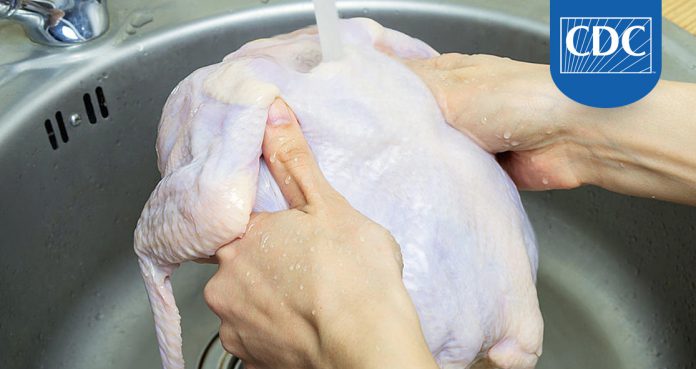Public health officials have once again warned people about the risks of washing raw chicken before cooking it. They said the pathogenic bacteria can spreading to utensils or other foods.
On April 26, the Centers for Disease Control and Prevention (CDC) tweeted, “Don’t wash your raw chicken! Washing can spread germs from the chicken to other food or utensils in the kitchen.”
The CDC on its website wrote, “Americans eat more chicken every year than any other meat. Chicken can be a nutritious choice, but raw chicken is often contaminated with Campylobacter bacteria and sometimes with Salmonella and Clostridium perfringens bacteria. If you eat undercooked chicken or other foods or beverages contaminated by raw chicken or its juices, you can get a foodborne illness, which is also called food poisoning. That’s why it’s important to take special care when handling and preparing chicken.”
The agency provided a list of steps to prevent food poisoning, which are as follows:
- Place chicken in a disposable bag before putting in your shopping cart or refrigerator to prevent raw juices from getting onto other foods.
- Wash hands with warm soapy water for 20 seconds before and after handling chicken.
- Do not wash raw chicken. During washing, chicken juices can spread in the kitchen and contaminate other foods, utensils, and countertops.
- Use a separate cutting board for raw chicken.
- Never place cooked food or fresh produce on a plate, cutting board, or other surface that previously held raw chicken.
- Wash cutting boards, utensils, dishes, and countertops with hot soapy water after preparing chicken and before you prepare the next item.
- Use a food thermometer to make sure chicken is cooked to a safe internal temperature of 165°F.
- If cooking frozen raw chicken in a microwavable meal, handle it as you would fresh raw chicken. Follow cooking directions carefully to prevent food poisoning.
- If you think the chicken you are served at a restaurant or anywhere else is not fully cooked, send it back for more cooking.
- Refrigerate or freeze leftover chicken within 2 hours (or within 1 hour if the temperature outside is higher than 90°F).
The CDC estimates that every year more than a million people get sick from eating poultry that is contaminated with pathogenic bacteria. That is why the agency has advised following the above-mentioned steps to protect your health when it comes to consuming chicken.
Food poisoning can be an unpleasant experience for anyone, especially children under 5, the elderly with weak immune systems, and pregnant women because they are at a greater risk of developing serious illnesses. The CDC recommends seeking a doctor if you have a high fever (temperature above 102 F), diarrhea that lasts for more than three days, bloody stools, prolonged vomiting, or any signs of dehydration such as dry mouth, scanty urine, or dizziness.























